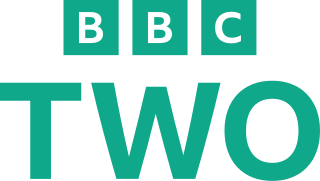
BBC Two is a British free-to-air public broadcast television channel owned and operated by the BBC. It covers a wide range of subject matter, with a remit "to broadcast programmes of depth and substance" in contrast to the more mainstream and popular BBC One.
Television in the Republic of Ireland is available through a variety of platforms. The digital terrestrial television service is known as Saorview and is the primary source of broadcast television since analogue transmissions ended on 24 October 2012. Digital satellite and digital cable are also widely used.

NI Railways, also known as Northern Ireland Railways, is the railway operator in Northern Ireland. NIR is a subsidiary of Translink, whose parent company is the Northern Ireland Transport Holding Company (NITHCo), and is one of eight publicly owned train operators in the United Kingdom, the others being Direct Rail Services, Northern Trains, Transport for Wales Rail, Southeastern, LNER, ScotRail, and TransPennine Express. It has a common Board of Management with the other two companies in the group, Ulsterbus and Metro.
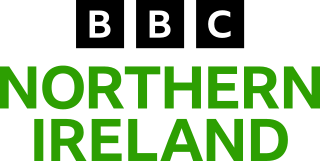
BBC Northern Ireland is a division of the BBC and the main public broadcaster in Northern Ireland. It is widely available across both Northern Ireland and the Republic of Ireland.
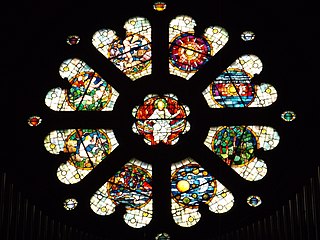
The culture of Ireland includes the art, music, language, literature, folklore, cuisine and sport associated with Ireland and the Irish people. For most of its recorded history, the country’s culture has been primarily Gaelic. Strong family values, wit and an appreciation for tradition are commonly associated with Irish culture.

BBC Radio Foyle is a BBC Northern Ireland local radio station, serving County Londonderry in Northern Ireland. It is named after the River Foyle which flows through Derry, the city where the station is based.
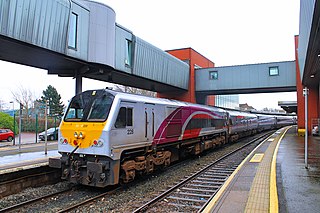
The Iarnród Éireann (IÉ) / Northern Ireland Railways 201 Class locomotives are the newest and most powerful diesel locomotives operating in Ireland and were built between 1994 and 1995 by General Motors Diesel. They are model type JT42HCW, fitted with an EMD 12-710G3B engine of 3,200 hp (2,400 kW), weigh 108.862 tonnes and have a maximum speed of 164 km/h (102 mph).
The mass media in the Republic of Ireland includes all the media and communications outlets of the Republic.

Enterprise is the cross-border inter-city train service between Dublin Connolly in the Republic of Ireland and Belfast Lanyon Place in Northern Ireland, jointly operated by Iarnród Éireann (IE) and NI Railways (NIR). It operates on the Belfast–Dublin railway line.
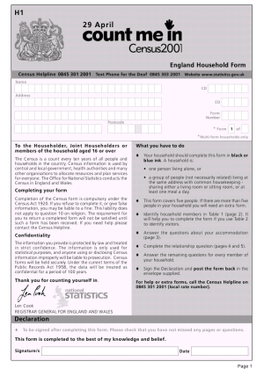
Coincident full censuses have taken place in the different jurisdictions of the United Kingdom every ten years since 1801, with the exceptions of 1941, Ireland in 1921/Northern Ireland in 1931, and Scotland in 2021. In addition to providing detailed information about national demographics, the results of the census play an important part in the calculation of resource allocation to regional and local service providers by the UK government.

Rosslea or Roslea is a small village in County Fermanagh, Northern Ireland, near the border with County Monaghan in the Republic of Ireland. It stands on the Finn River and is beset by small natural lakes. Rosslea Forest, also known as Spring Grove Forest, is nearby. In the 2011 Census it had a population of 528 people.
The British and Irish Legal Information Institute provides legal information, and especially reports of cases decided by courts, in the United Kingdom generally and the Republic of Ireland. Decisions from England and Wales, the Republic of Ireland, Northern Ireland, Scotland, the European Union, and from the European Court of Human Rights, are put online. It is a partial online database of British and Irish legislation, case law, law reform reports, treaties and some legal scholarship.
Analogue terrestrial television in the United Kingdom was originally the method by which the significant majority of viewers in the UK, the Channel Islands and the Isle of Man received television. Analogue terrestrial television broadcasts have fully ceased in the UK with Northern Ireland being the last region to have ceased transmission analogue terrestrial television broadcasts. Northern Ireland switched off the last analogue television signals, making all of the United Kingdom only capable of receiving digital television, in the early hours of 24 October, 2012. It has been completely replaced by digital terrestrial television and other non-terrestrial means as of the end of 2012.
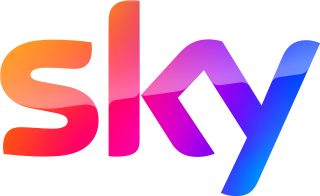
Sky Ireland Limited is a subsidiary of Comcast-owned Sky UK and supplies television, internet and telephony services in Ireland.

Healthcare in the United Kingdom is a devolved matter, with England, Northern Ireland, Scotland and Wales each having their own systems of publicly funded healthcare, funded by and accountable to separate governments and parliaments, together with smaller private sector and voluntary provision. As a result of each country having different policies and priorities, a variety of differences have developed between these systems since devolution.
Television in Northern Ireland is available using, digital terrestrial, digital satellite and cable.

Raidió Teilifís Éireann is an Irish public service broadcaster. It both produces and broadcasts programmes on television, radio and online. The radio service began on 1 January 1926, while regular television broadcasts began on 31 December 1961, making it one of the oldest continuously operating public service broadcasters in the world. It is headquartered in Donnybrook in Dublin, with offices across different parts of Ireland.
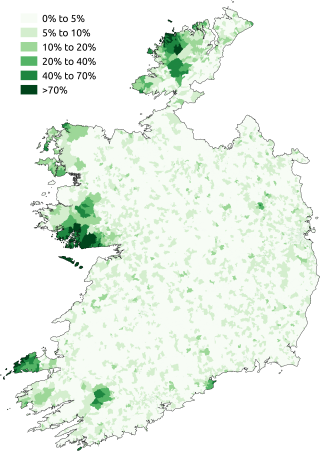
The official status of the Irish language has remained high in the Republic of Ireland from foundation. This reflects the dominance of the language in Irish cultural and social history until the nineteenth century and its role in Irish cultural identity. In 2022, strong recognition was added in Northern Ireland also. In the 2022 Republic of Ireland census 1,873,997 people or 39.8% of the population in the Republic of Ireland said that they had some ability to speak Irish, out of an overall population of 5,149,139. In Northern Ireland 228,600 people (12.4%) have some ability in the Irish language according to the 2021 census for Northern Ireland, out of a population of 1,903,175 people. It has been found, however, that while ideological support for Irish is high, actual routine use is very low, and that there is very little or rare correlation between personal fluency in the language and the perceived value of Irish as an identity-marker. Nevertheless, the language benefits from the support of activists who continue to use it as a social and cultural medium.
The following is a timeline of the COVID-19 pandemic in Northern Ireland during 2021. There are significant differences in the legislation and the reporting between the countries of the UK: England, Scotland, Northern Ireland, and Wales.